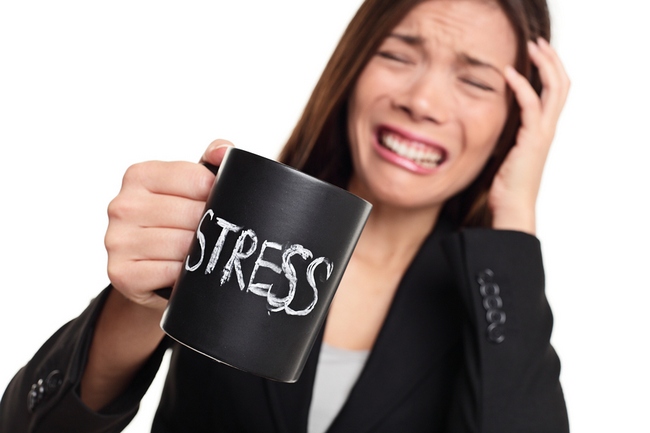- Make It Yourself Lavender Heart-Shaped Bath Bombs!
- 20 Things You Never Knew About “Down There”
- 12 Best Foods For Those Suffering From Arthritis Pain
- 12 Personal Hygiene Mistakes Almost Everyone Makes (Mom Never Told You About #4!)
- 15 Medicinal Plants And Herbs From The Cherokee People
- 12 Mind-Blowing Benefits Of Drinking Coconut Water During Pregnancy
- 12 Outstanding Winter Foods That Won’t Fatten You Up Like A Christmas Turkey
Are You Suffering From Adrenal Burnout? How To Tell And What To Do

Photo credit: bigstock.com
When you think of burnout, you probably think of those people who go, go, go all day, all night, never taking a vacation, always working, working, working. Many people who suffer from what we call burnout should actually be called adrenal burnout. This is a disease caused by stress, and you might have it and not even be aware of it.
If you get incredibly crabby when you are hungry, if you feel exhausted most of the time, if every little upset in your life drains you to where you feel overwhelmed, you are probably suffering from adrenal burnout.
What exactly is adrenal burnout, and how can you stop it?
Adrenal burnout is actually a natural process that, in our modern day lives, has gone terribly wrong. As humans have evolved, our bodies have developed ways to ensure our survival.
For example, when a bear jumped out of the woods intent on making us its next meal, our bodies learned ways to ensure that we had enough energy to get out of the way or to kill the bear. This is often referred to as the “fight or flight” system.
That fight or flight is triggered into action when we feel stress or fear.
When we feel fear, the hypothalamus puts out a hormone that tells the adrenal glands to release cortisol. Cortisol will stimulate the pancreas to release glucagon, which raises your blood sugar levels to give your body the energy it needs to either stay and fight or run away.
This sounds good, right? The problem here is that this system is meant to only keep us going for a short time, just enough time to run away from or to fight that bear.
Continue to Page 2

Photo credit: bigstock.com
Unfortunately, our bodies cannot tell the difference between a real threat, like that bear, or a mugger, or simply being late with that important report.
When we live under constant stress, that fight or flight response depletes the body of the resources it needs for longer term survival. The adrenal gland becomes depleted and your chronically high cortisol levels, which are bad for you, become chronically low, which is even worse.
In short, this is what causes adrenal burnout.
Symptoms Of Adrenal Burnout
Most people don’t believe that they are under a great deal of stress most days. See if any of the following symptoms apply to you before you dismiss having adrenal burnout:
- Problems with hormones or libido: Perimenopause symptoms become worse, PMS becomes severe, and libido drops to very low, sometimes non-existent, levels.
- Blood pressure: Both high and low blood pressure are signs to be aware of.
- Sleep: Either the inability to fall asleep, staying asleep, or sleeping soundly but waking up still feeling exhausted.
- Food cravings/weight changes: Do you sometimes feel uncontrollable urges for sugary or salty foods? Are you gaining weight in the thighs and abdomen?
- Low immune response: Taking longer than normal to recover from infections or injuries, becoming sick more often, or developing frequent infections.
- Energy: You either are always on fast forward, or you have chronic fatigue. A few people feel wired most of the time, but lack the energy to do very much.
- Thinking: Fuzzy or foggy thoughts, inability to concentrate, and constantly racing from one thought to the other.
- Emotions: Difficulty or inability to deal with daily stress, feeling overwhelmed and unable to get through the day, having a very short fuse, panic attacks and anxiety attacks over minor problems.
If any of these sounds like you, chances are pretty good that you have adrenal burnout. Now, there are other diseases and health problems that have many of the same symptoms, so this doesn’t mean for sure that you have adrenal burnout. You know your own life and feelings. Is your life full of stress and poor nutrition? Do you rarely take vacations or time to yourself? Are you overwhelmed with responsibilities? Do you feel that these things are the basis for the above symptoms? If you answered yes to most of these, keep reading. We will list some steps you can take to allow your adrenal glands to recover.
Continue to Page 3

Photo credit: bigstock.com
Foods To Eliminate
One of the best things you can do to help your body recover is to start by removing certain foods from your diet.
Sugar fuels the adrenal exhaustion process. When your blood sugar is low, you crave sugar. When you eat sugar, the body must produce insulin. This cycle drains the adrenals. If you find you are craving sugar, try eating small amounts, just a quarter or a half a teaspoon under the tongue will help satisfy your craving, but won’t spike your blood sugar enough to matter. Read more how to stop sugar cravings.
Caffeine also fuels this process. Limit your coffee intake to one cup each day, and then replace any remaining cups of coffee that you would normally drink with green tea. Although green tea has caffeine, it also contains theanine, which encourages calmness, improved concentration, and relaxation.
SEE ALSO: Top 6 Coffee Alternatives
What Else Can I Do?
Eat more protein. This will stabilize your blood sugar levels and help to reverse adrenal fatigue. Eat a bit of protein with each meal; try nuts, eggs, cheese, fish, and poultry. Limit your intake of red meat. Eggs are a great choice, as they are one of the most balanced proteins you can find. Starting off your day with eggs is a great way to avoid blood sugar spikes and adrenal fatigue.
Try eating smaller meals throughout the day (include a bit of protein in each meal), rather than eating three larger meals. This can also normalize blood sugar levels.
Drink as much water as you can throughout the day. Your adrenal glands regulate your blood pressure and blood volume, and you need plenty of water to do both. You also need salt. If you crave salt, try adding just a handful of salted nuts spread out throughout the day, but don’t overdo it. If you don’t crave salt, then don’t add any extra to your food. Salt is one of those things where a little bit goes a long way.
Continue to Page 4

Photo credit: bigstock.com
Adrenal Supplements
- Licorice – Adding a licorice root supplement to your diet can really help with adrenal fatigue by slowing down the way adrenal hormones are broken down. This will take the pressure off of your adrenals. Take between 200 and 400 mgs each day.
- Chromium – This helps to regulate blood sugar levels and will go a long way towards stopping those sugar cravings. Take 200 mcg each day.
- Adrenal Extracts – Sometimes called Glandular Supplements, these are a kind of gross but really effective way to support the adrenals. These are the nutrient-rich portions of healthy glands from cows or pigs in capsules that help repair your damaged organs and tissues. Take 200 to 500 mgs each day.
- Tyrosine – For support of the production of noradrenaline, take a tyrosine supplement with between 500 and 1000 mgs each day.
- Vitamin C – Your adrenal glands have more vitamin C than any other part of your body. Be certain that you are getting at least 300 mgs of vitamin C each day. You should try to get this by eating more citrus fruits, but if you can’t, take a supplement that will give you at least 500 mgs each day.
- Vitamin B5 – Since most B vitamins work in combination with each other, you should take a B complex supplement. Be sure that it contains at least 100 mgs (to a maximum of 300 mgs) of vitamin B5, otherwise known as pantothenic acid.
Stress is the silent killer of modern times. We tend to laugh it off or just ignore it, but the truth is that the health consequences of chronic stress are grave. Every single system in the body is affected by stress. Break the stress habit. Find ways to manage your stress, such as with yoga or meditation, and eliminate as much stress as possible from your life. Don’t be afraid to say no on occasion. Be sure you get at least seven hours of sleep each night. Remove or limit the people who cause you the most stress in your life.
About Exercise
Although everyone stresses how important exercise is (and it is!), when you are already feeling exhausted, the last thing you need is to stress your body even more. Exercise increases cortisol levels, which is something you don’t want at this time. To keep those cortisol levels in line, tone down on the exercise for a while, until your body can heal. Light exercises such as walking, yoga, and non-competitive swimming are all good choices.
Don’t feel bad if you end up binging on sugar, or if you can’t get to bed on time once or twice. Life isn’t perfect, and things happen. As long as you doing your absolute best 90 percent of the time, the other 10 percent won’t matter.
The good news about adrenal burn out is that it is completely reversible. Like a well, it can be restored and replenished with good care and good food.
References:
































